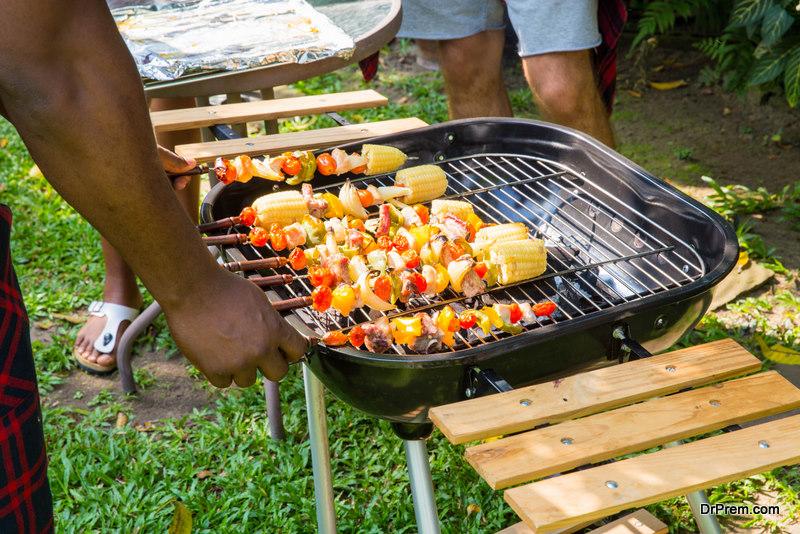Backyard barbecues can be a lot of fun, but they can also produce a lot of waste and use a disproportionate amount of energy. We all want to have as much fun as possible this summer, but it’s easy to have fun while also pursuing greater sustainability strategies.
Keep Your Cooking Plans Efficient
Some approaches to cooking are simply more efficient and more sustainable than others, so plan proactively to keep your cooking plans efficient.
1. Invest in energy efficient appliances
You can start by investing in energy efficient appliances. Most modern appliances are designed to use as little energy as possible, without sacrificing performance quality. Any modern gas grill is likely to be more efficient than a gas grill from 10 or 20 years ago. Similarly, certain types of grills are more efficient than others; generally, wood pellets are considered to be more sustainable than charcoal, for example.
2. Cook everything at once (if you can)
Certain types of grills,like the Traeger Timberline, are designed to make it easy to cook multiple types of food at once. This way, you minimize the amount of time you spend cooking, without sacrificing any dishes or sides. It requires a bit more coordination, but ultimately, it’s also more convenient for the chef.
3. Keep the grill closed
Keep your grill closed as much as possible. This is a golden rule for most types of food preparation, as it retains heat better and may create more aromatic, tastier food. Obviously, you’ll have to open the grill at some point, but postpone this as much as possible.
4. Avoid overbuying/overcooking
Barbecue hosts often make the mistake of buying and cooking way too much food. There’s nothing wrong with being prepared, and it certainly pays to buy a little extra of everything just in case someone shows up with an unexpected guest. But if you’re not careful, you could end up wasting tons of food – and tons of money in the process.
Shop Locally (or Grow Your Own Food)
The most sustainable option for procuring food is growing your own in a home garden. If you have plenty of time to prepare, you can create raised beds in your backyard and grow your own fruits and vegetables. Failing that, your best option is to shop at a local farmers market and buy from other people who have grown their own food.
If you do have to buy your food from a grocery store, these are some tips that can help you do it more sustainably:
1. Bike or walk
If you can, bike or walk to the store. If the store is beyond biking or walking distance, consider using public transportation or carpooling.
2. Select foods that are in season
Fruits and vegetables that are in season tend to be less expensive, more abundant, and tastier; they also tend to be more sustainable, since they can be easily sourced locally. Selecting foods that are in season is advantageous for reasons beyond sustainability, so there’s no reason to skip this tip.
3. Choose sustainable brands
If you’re shopping for specific ingredients, and you have a choice between two brands, consider choosing the brand that’s more sustainable. Most businesses now publish sustainability reports, so do a bit of due diligence when comparison shopping.
4. Prioritize less packaging
On the surface, you can identify a more sustainable product based on its level of packaging. More sustainable products have leaner, less wasteful packaging.
5. Bring your own bags
And of course, you should consider bringing your own bags to the grocery store. Paper bags are better than plastic, but both are considered disposable; you’re better off using something that’s meant to be permanent.
Limit the Meats
The meat industry is unsustainable. Meat products require far more energy to produce and distribute than their plant-based counterparts. This is an unpleasant truth that meat lovers everywhere hate to acknowledge. Now, there’s nothing wrong with firing up the barbecue and enjoying some of your favorite meats with your favorite people, but if you’re making a concentrated effort to live a more sustainable lifestyle, consider reducing the meat you prepare in favor of plant-based ingredients.
Forget Disposable Products
The United States creates more than 268 million tons of trash every year, which is astronomical, considering our population of roughly 332 million. Part of the problem is our reliance on disposable products, like paper plates and silverware. Disposables are highly convenient for backyard barbecues, but they’re also very wasteful. Consider going paperless and using reusable dishes, silverware, and even napkins.
Making your backyard barbecue a bit more sustainable isn’t going to save the world by itself, but if we all make similar efforts, we can make a collective impact. Any positive changes that you make are steps in the right direction.
Article Submitted By Community Writer




